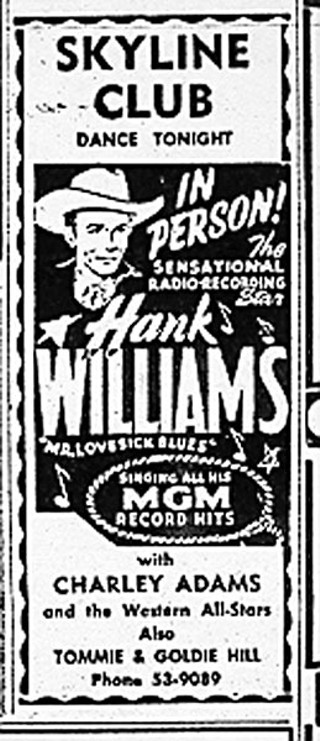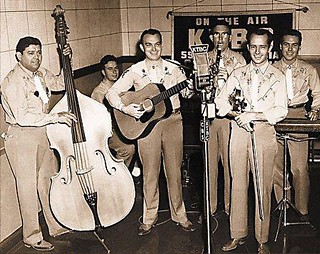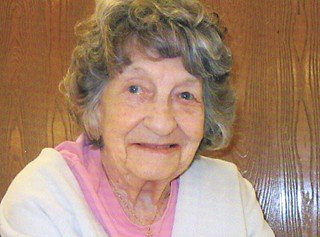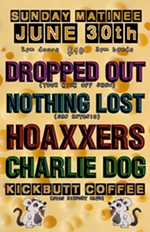The Town Was Hoppin'
Ramblin' Ray Campi remembers Austin music's Fifties
By Michael Corcoran, Fri., March 30, 2012

Wild-eyed rockabilly veteran Ray Campi wrote his first song on the last day of 1949 and left Austin at the end of 1959. He's a man of the Fifties in his hometown, so in his mind the Magnolia Cafe on South Congress is still Flossie's Drive In, where country acts like Leon Carter and his band the Rolling Stones performed. He still calls far South Congress Avenue – home of such Fifties clubs as the Cinderella, Rudy's Drive In, the Alibi, Gil's, and the Top Hat – "the San Antonio Highway."
While legions mourn the 1980 closing of the Armadillo World Headquarters on Barton Springs Road, Campi has fonder memories of the 1,500-capacity hall when it was the Sportcenter, where he and such acts as Betty Barnes, the Hubcats with Hub Sutter, and the Hungry Mountain Boys would play the Saturday night Jamboree. Billed as the "Folk Music Fireball" by an Austin promoter, Elvis Presley played the future hippie haven on August 25, 1955, one of four local appearances before his January 1956 national TV debut.
"Some people talk like Austin became a music town in the Sixties and Seventies," says Campi, who owns a house in Spicewood, yet has lived primarily in Los Angeles for five decades. "But the town was hoppin' when I was coming up."
The dynamic 77-year-old "Rockabilly Rebel," who stands on his bass fiddle while slapping the strings in double time, remembers a time when Dessau Hall near Pflugerville and the Skyline Club on North Lamar ("the Dallas Highway") were "the Palladiums of Central Texas." Touring and local country bands would also play the Buckholts SPJST Hall in nearby Milam County, where an 18-year-old Campi was called up onstage by his guitar hero Merle Travis to sing "San Antonio Rose" in 1952.
Because Austin is home to the most liberal state college in Texas, it's always had something going on musically. In the Fifties, Downtown was swingin' with the Jade Room (2514 Guadalupe), Squirrel's Inn (415 Barton Springs Rd.), and New Orleans Club (1123 Red River). The roots-rockin' Continental Club opened in 1955 at 1315 S. Congress, just up from the Terrace Motel and nightclub, but it was more of a jazz club, with owner Bill Turner's trio playing most nights.
In the otherwise barren hills of West Lake, musicians played the Elm Grove Lodge, which gained fame during the Seventies as the home of the Soap Creek Saloon.
Over on the Eastside, you had Charlie's Playhouse (1206 E. 11th), Big Mary's/Alabama Club (1808 E. 12th), the Victory Grill (1104 E. 11th), and more juke joints. "We used to go to Charlie's on Friday nights to learn the latest dances," recalls antique dealer Charles "Lucky" Attal, who attended Austin High in the late Fifties, when it resided at the current 12th Street location of ACC. Blues Boy Hubbard & the Jets were the house band at Charlie's.
Most major black acts, including Bo Diddley, Big Joe Turner, and Little Richard on one memorable night, played Doris Miller Auditorium. The great KVET-FM deejay and musician Lavada Durst, a true Austin icon, brought in such giants as Duke Ellington and Sam Cooke.
Perhaps the biggest concert of the Fifties in Austin was an Oct. 7, 1957, show at City Coliseum on Barton Springs Road that featured Fats Domino, Buddy Holly & the Crickets, Chuck Berry, the Everly Brothers, the Drifters, LaVern Baker, Clyde McPhatter, and more. Lucky Attal's son, Charles of C3 Presents, would kill for talent like that at the Austin City Limits Music Fest.
For Hispanics, a weekly highlight in the Fifties was the Nash Hernandez Orchestra's "Friday Frolics" at Zaragoza Park. Manuel Donley, Shorty & the Corvettes, Roy Montelongo, and more locals benefited from exposure on Lalo Campos' radio show for KVET. Never-recorded accordion master Camilo Cantu, meanwhile, had couples dancing at La Polkita, an open-air venue bounded by Christmas-tree lights in Del Valle.
With a memory as sharp as his vintage threads, Campi remembers an Austin of old like the past five decades were a week and a half. He'll talk your ear off, but you'd be wise to take notes.
Ramblin' Ray remembers not only the music scene, but can also still describe details about restaurants like Lung's Chinese Kitchen (1128 Red River), Austin's first Asian sensation, and the Sho-Nuff Cafe (2006 S. Lamar, later home to Bag O' Chicken), where Europe-adored musician Calvin Russell's parents worked. He recalls the fanfare when the Twin Oaks Shopping Center ("the largest in town") opened at South Congress and Oltorf in 1955.
"There were seven drive-in movie theatres in Austin in the Fifties," says Campi, rattling off the names: the Burnet Road Drive-In, the Delwood, the North Austin, the South Austin, the Montopolis, the Chief, and the Longhorn.
The competition was fierce, and one time Campi got drawn into a publicity stunt at the Chief Drive-In (5601 N. Lamar).
"There was a guy who was buried alive for a month," laughed Campi. "He wasn't really buried. There was a secret door and he'd go home after the last showing each night. But one day [studio owner] Roy Poole had an idea to record a song from the grave, so he had me play the guitar while the guy sang."
Before Poole opened the Austin Recording Company on the second floor of the Littlefield Building at Sixth and Congress in the early Fifties, the only recording studio in town was the Radio House on the University of Texas campus, where Campi recorded several tracks. As described by Campi, the former Radio House was almost certainly the brick annex of the historic Littlefield Building on campus.
Wild Side of Life
On a recent stop in Austin, Campi visited his childhood home at 1116 W. Sixth for the first time in decades. The two-story brownstone with a house in back is now Fortney's West End antique store.
"Hi, I'm Ray Campi and I used to live here," he tells one of the store employees. "I made some records in the Fifties, but you've never heard of me."
He never became more than a local act, at least in his prime. After recording a regional hit ("Caterpillar" b/w "Play It Cool") for San Antonio's TNT Records, Campi was signed to Dot, the home of Pat Boone, in 1957. Although his single "It Ain't Me" went nowhere, it led to a lip-synced appearance on American Bandstand, which made him a star back home.
Campi was then courted by Domino Records, Austin's first label of note, which made a little noise, but not much money in the years between Elvis and the Beatles. Formed in 1957 as a night school project, Domino featured such acts as the Slades, Joyce Webb, Barney Tall, and Joyce Harris, a white singer from New Orleans whose backing band was a black group from East Austin called the Daylighters.

Campi's contribution to the Domino catalog was "My Screamin' Screamin' Mimi" in 1958, but when that rocker didn't make it farther than the sock hops of Hancock Clubhouse and the Teen Canteen near Camp Mabry, Campi moved to Los Angeles.
Returning to his family's former home on West Sixth brings back happy memories for Campi, who's of Cuban and Scotch/English descent, and who learned to play guitar on the steps out back.
"This was Alex Fischer's grocery store when my dad bought it in 1943," recalls Campi of the first floor storefront. Having sold his flooring business and family home in Yonkers, New York, to explore a new frontier, Campi Sr. had some money to buy property. "Part of the deal was that Mr. Fischer would teach my dad how to cut meat."
With a head for business ("which wasn't passed on to me," nods Campi), Ray Campi Sr. converted a back room of the grocery store into a minibarracks with six bunk beds. "He'd send me and my brother Harvey to the bus station with fliers. A lot of G.I.s in town from Camp Swift or Fort Hood couldn't afford hotel rooms, so we'd rent them a cot for a couple bucks a night."
Austin was booming after World War II, with the population rising from 87,930 in 1940 to 132,459 in 1950.
The local music scene during that time was dominated by Western swing bands like Jesse James & All the Boys, Jimmy Heap & the Melody Masters, Doug & the Falstaff Swing Boys, Buck Roberts & the Rhythmaires, and Dolores & the Blue Bonnet Boys, who'd all throw in a couple polkas for the old-timers. The Taylor-based Heap band recorded nascent versions of classics "Wild Side of Life" and "Release Me," later made more famous by Hank Thompson and Ray Price, respectively.
"When my family moved to Austin, my father wanted to feel more like a Texan, so he bought a record by Bob Wills & the Texas Playboys," says Campi, who was 9 at the time. "Two of my favorite things were cowboy movies and big band music, so I took to Western swing right away."
It was a daytime set on Sixth Street by hard-drinking country singer and songwriter Gene Snowden in 1947 that inspired Campi to become a musician. He was an eighth-grader at St. Mary's Academy at 10th and Brazos and had enough time to catch a Western at the Ritz Theater before walking home for dinner.
"If you were under 12, you got in for a nickel, so we'd go to the Diamond Bar, which was owned by our friend Joe Sabb's mother, and she'd sign a note saying that we were all 11 years old," explains Campi.
Playing that day on the club's loft stage was Snowden, who Campi calls "Austin's original hillbilly poet." Instead of the flick, Campi stayed and watched Snowden and his great guitar player Curly Top Clayton.
"It was an epiphany. They had a song called 'Quit Your Triflin',' which I started covering in my first band."
Campi made his show business debut in 1949 as part of a hillbilly comedy act with Joe Bill Hogan and Betty Jo Gregory. They performed such tunes as "Why Don't You Haul Off and Love Me" at Saengerrunde Hall before popular play The Drunkard. The Geezinslaws, another group modeled after satirical hillbilly duo Homer and Jethro, were usually on the bill.
Featuring Sammy Allred and Dewayne Smith, who had a side group called the Rockabillies, the Geezinslaws became a big deal in Austin, appearing on national television and attracting a dedicated fanbase.
"My parents used to tell a story about going to see the Geezinslaws with another couple when they were playing Bull Creek Lodge [now County Line]," says South by Southwest Executive Director Roland Swenson, whose parents met at Austin High. "Back then, 2222 was a two-lane, winding road over the hills. The roads were icy that night, so it was slow going and my father's friend sat on the hood of the car looking for icy spots so they didn't slide off the hill."
As a senior in high school, Campi formed Ramblin' Ray & the Ramblers, whose guitarist was Campi's cousin Harold Layman, a native of Newfoundland. "Harold was six years older, and he had a job with the Coca-Cola plant near Treaty Oak. There were a couple of guys at his job, Slim Hendricks and Buddy Wyatt, who showed him a few chords on the guitar and he showed me."
Further education came at 1pm every day at the Brown Building, where Jesse James & All the Boys played live on Lady Bird Johnson's KTBC. Cactus Pryor, who later hosted the weekly Now Dig This TV show at the Driskill Hotel, was emcee. Campi and his future St. Edward's High classmate, aspiring steel guitarist Bert Rivera, were often in the audience for the James gang.
"I would usually go with my cousin Frank Garza," confirms Rivera, who played steel guitar for Hank Thompson from 1961 to 1971. "We were going to St. Mary's just a couple blocks away and the James band played during our lunch break."
Rivera became fascinated with the steel guitar when family friend Johnny Ross, one of Dolores' Blue Bonnet Boys, played at gatherings. At 12, he finally got his Stella guitar, which he played on his lap with a slide.
"I'd key on the steel player Jim Grabowske [of the Jesse James band] and try to emulate him," says Rivera, who lives near Boerne. "They also had a great piano player named Harold Horner. They were the best Western swing band in town."
Cocoanuts to Palm Trees
Whenever Campi returns to Austin, he always visits his former bassist Henry "Poochie" Hill, who backed countless country greats including Johnny Horton's final performance in the house band at the Skyline. Loretta Lynn wanted to take Hill out on tour with her in the early Sixties, but he couldn't go.
"I had a good job [as construction inspector] with the city," says Hill.
Poochie and his older brother Doug, who played bass for Willie Nelson in the Fifties, owned the first electric Fender guitar and bass in town, pre-ordered in 1952 from the J.R. Reed music store on Congress. This made them in particularly high demand.
"When folks went out, they wanted to hear the songs the way they heard them on the radio, so when Billy Byrd [from Ernest Tubb's band] came out and honky-tonk became the going thing, you had to have an electric guitar," recounts Hill.
Hill was nothing if not versatile, having also played in orchestras, and links country music to pop in Austin. He replaced Bobby Doyle, the first blind graduate of McCallum High, on bass in the Slades when Doyle set off on his own. The great piano thumper eventually formed the Bobby Doyle Three with UT dropout Kenny Rogers on bass.
"The Slades were the only act on Domino that sold any records," says Ed Nichols, who founded the label along with Jane Bowers, Bob Williams, Lora Jane Richardson, Kathy Parker, and Ann Miller. (Nichols ended up as a U.S. Agriculture bigwig during the Carter administration.)
Signed to Domino after performing at a Girl Scouts event, the Slades were originally called the Spades, after a deck of cards, but had to change the name for unintended racial connotations. "The Spades" was, ironically, also the name of Roky Erickson's first band, five years later.
Led by the talented yet mercurial Don Burch, the band was poised for a national breakout in 1958, with soulful doo-wop number "You Cheated" getting them booked on American Bandstand. Major labels circled, but Domino wanted to handle "You Cheated" itself and struck a distribution deal with a Los Angeles company.
Turns out that the "one-stop" oversold its capabilities, so while the Slades original waited to be pressed and distributed, an L.A. producer cheated, assembling a group of black singers, including Johnny "Guitar" Watson and Jesse Belvin, to copy the tune as the Shields. That version made it to No. 12 on the Billboard singles chart while the Slades' original stalled at No. 42.
Another Austin act on the verge of bigger things in the Fifties was West Austin housewife Vivian Worden, who played a Gibson L-5 guitar and billed herself as Betty Barnes. Originally from the mountains of Virginia near Roanoke, Worden, who passed away this Valentine's Day at age 83, moved to Austin in 1953 and got recording and publishing deals with TNT. Although her own records were hillbilly bop à la Wanda Jackson, Worden had a great range as a songwriter and recruited a black group from East Austin called the Chantones to record two of her songs, "Dear Diary" and "Cocoanuts to Palm Trees."
"The lead singer was named Bertha, and she could really put it out there," Worden said in September, a week before the South Austin nursing home where she lived celebrated her musical career, even hiring an Elvis impersonator. Worden met Presley in Nashville, Tenn., when she appeared on The Grand Ole Opry in 1956.
"Our father didn't really support mother's musical career," said Worden's daughter Judy Sheffield. "It just wasn't something married women with children did back then."
The Austin Waltz
Ray Campi finally retired from the biz, he thought, in 1967 when he became a full-time teacher in the Los Angeles public school system.
Yet that failed Dot 45, which Campi says suffered from "an appallingly bad mix," ended up blowing a big second wind behind Campi's career four years later. A German rockabilly fanatic named Ronnie Weiser flipped over "It Ain't Me," which featured Doc Shyrock's finger-snapping instead of a drummer, and signed Campi to his Rollin' Rock label. After having most of his forgotten Fifties sides reissued, Campi made several highly regarded new recordings in Weiser's living room. Campi was stunned to be hailed a rockabilly pioneer on his first tour of Europe in 1977 with his band the Rockabilly Rebels.
"I never had any hits, but those folks knew every one of my songs," marvels Campi today, his dark eyes punctuating the conversation. "My students Google me and find out about my other life. They print out pictures of me in my wild-man getup and say, 'Mr. Campi, is this really you?'"
Although he retired from teaching in 1999, Campi still occasionally receives 6am calls to substitute.

"Ray's always complaining that he never made it," says local writer and music impresario Joe Nick Patoski, who booked Campi's return to Austin in the Seventies, a notorious show immortalized in "Rockin' at the Ritz." "So I'll ask him, 'Didn't you just get back from touring Europe? Don't you have all these young musicians who look up to you?' C'mon, Ray. You're doing great."
He was Austin's answer to Gene Vincent, even opening for the rockabilly legend at the City Auditorium (later Palmer, currently the Long Center) in Jan. 1958. But that night ended up being a highlight of Campi's career, not a stepping stone. He was one of the dreamers who worked hard to make it happen. Austin was full of them. Still is.
The song that best brings him back to those days of spot dances and necking in the hills above Barton Springs Pool is "The Austin Waltz" by Dolores & the Blue Bonnet Boys. Recorded by KVET Program Director Fred Caldwell for his Lasso label, "The Austin Waltz" is, according to Campi, "the greatest song ever written about my hometown." He cut his own version in 1980 and let the words flow through him.
"Why did I ever leave you?/When I loved you so much/Please let me come back to you, dear/And dance to the Austin Waltz."
Eerie Skyline Coincidence
The Skyline Club remains infamous for hosting the final public performances of Hank Williams (Dec. 19, 1952) and Johnny Horton (Nov. 4, 1960), who were both married to the former Billie Jean Jones Eshlimar at the times of their deaths.
"Justin Tubb [Ernest's son] was going to UT at the time and I was friends with him and the Tubb Boys, so we spent the day with Hank Williams, visiting Hays Record Shop on East First Street," said Jerry Green, the former Austin singer who went on to play The Grand Ole Opry and Louisiana Hayride.
"Hank was trembling something fierce that day," recalls Green, who dropped Williams back at the Stephen F. Austin Hotel before the show. "But when he played, he did a fine job."
Hank Williams died of a heart attack brought on by drug and alcohol abuse 12 days after the Skyline show.
Built in 1946, the Skyline was torn down in 1989 to make way for the expansion of Braker Lane. During the early Eighties, it served as the second location of Soap Creek and after that, helped hatch the New Sincerity scene as the short-lived Sparky's.
A version of this story originally ran on Michael Corcoran's blog: www.michaelcorcoran.net.
















